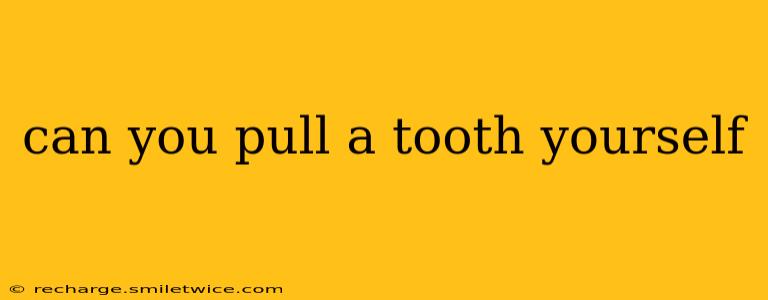Can You Pull a Tooth Yourself? A Risky Proposition
The short answer is: no, you should absolutely not attempt to pull your own tooth. While the internet is rife with DIY dentistry "hacks," attempting to extract a tooth at home is incredibly risky and can lead to serious complications. This isn't something to be taken lightly; professional dental care is crucial for safe and effective tooth removal.
Let's delve deeper into why self-extraction is a bad idea and explore safer alternatives.
Why You Shouldn't Pull Your Own Tooth
There are several compelling reasons why attempting to pull your own tooth is dangerous:
-
Infection: Your mouth is teeming with bacteria. Pulling a tooth at home dramatically increases the risk of infection, which can spread throughout your body. A professional extraction is performed under sterile conditions to minimize this risk.
-
Damage to Adjacent Teeth: Using improper tools or techniques can easily damage the teeth surrounding the one you're trying to remove. This can lead to further dental problems and expensive restorative work down the line.
-
Broken Tooth: Instead of removing the tooth completely, you might only break it, leaving fragments embedded in your gum. This necessitates more complex and potentially painful procedures to remove the remaining pieces.
-
Damage to the Jawbone: Incorrectly applying force can fracture your jawbone, leading to significant pain, prolonged healing time, and potential long-term complications.
-
Excessive Bleeding: Pulling a tooth can cause significant bleeding, especially if you're not equipped to manage it effectively. You could experience prolonged bleeding, leading to anemia or other complications.
-
Nerve Damage: Your teeth are closely associated with nerves. Improper extraction can damage these nerves, causing numbness, tingling, or even persistent pain in your mouth or jaw.
What Happens If a Tooth Needs to Be Pulled?
If a tooth needs to be removed, it's essential to seek professional dental care. A dentist will perform a thorough examination to determine the best course of action. They have the necessary tools, expertise, and sterile environment to ensure the procedure is performed safely and effectively. They will also address any underlying issues contributing to the need for extraction.
What are the Signs I Need to See a Dentist About a Tooth?
Several signs indicate you need to see a dentist regarding a problematic tooth. These include:
- Severe Toothache: Persistent or intense pain that doesn't respond to over-the-counter pain relievers.
- Swelling or Abscess: Noticeable swelling or a pus-filled pocket near the affected tooth.
- Loose Tooth: A tooth that is significantly loose or wobbly.
- Broken or Cracked Tooth: A visible crack or fracture in your tooth.
- Gum Disease: Noticeable gum recession or bleeding gums.
What are the Alternatives to Pulling a Tooth?
Before resorting to extraction, a dentist will explore less invasive options like:
- Root Canal: This procedure aims to save a severely damaged tooth by removing the infected pulp and sealing the tooth.
- Dental Crown: A crown can protect a weakened or damaged tooth, restoring its function and appearance.
- Filling: For cavities, a filling can restore the integrity of the tooth.
How Much Does Tooth Extraction Cost?
The cost of a tooth extraction varies based on several factors, including the complexity of the extraction, your location, and your dental insurance coverage. It's best to contact your dentist directly for an accurate cost estimate.
In conclusion, while the temptation to tackle a loose tooth yourself might be strong, resisting that urge is crucial for your overall oral health. Seeking professional dental care is the only safe and responsible way to handle tooth extraction or any other significant dental problem. Don't risk serious complications; schedule an appointment with your dentist as soon as possible.
